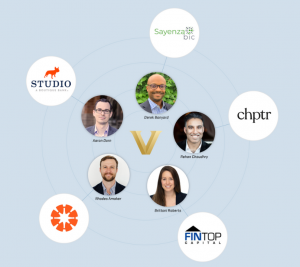By Kara Sherrer
While many people dream of one day starting their own business, navigating the complex world of investors can be tricky. We sat down with five Vanderbilt Business alumni to discuss their advice for networking with investors and raising capital in 2025.
Navigating the Main Fundraising Stages

Fundraising for startups that have high-growth potential often follows an orderly series of investment rounds. Founders will usually raise the initial $100,000 to $250,000 from friends and family in a pre-seed round. Then, after the product launches, founders will turn to individual angel investors or angel syndicates for a larger seed round. If successful enough, founders will then pitch their startups to bigger venture capital firms to raise more money during their Series A round, Series B, and so on.
However, not every founder ends up following this exact order of investment rounds. For example, Rhodes Amaker (MMHC’17) skipped the friends and family round entirely when co-launching his nutrition startup, Sylvan Health. Due to his healthcare contacts, he brought on Blue Cross Blue Shield of Tennessee as a customer before any formal fundraising took place. This early success helped his company secure an initial round of funding from Looking Glass Capital and a second round from Max Ventures. Amaker and his co-founders are now working on raising an official Series A round during the latter half of this year.
Other entrepreneurs have to raise even larger amounts of capital at the beginning. Aaron Dorn (MBA’17), who co-founded Studio Bank in Nashville, had to raise a total of $50 million just to launch, $4 million in seed capital to get the ball rolling, and then an additional $46 million to actually open the bank. “I often refer to [the bank] as a startup on steroids, because there’s enormous regulatory, capital, governance, and staffing requirements,” he said.
Networking with Potential Investors
Every startup founder leverages their network to meet potential investors, but that networking looks different for each one. In Derek Banyard’s (MBA’08) case, the connection was straightforward: About 30 of his former classmates came together to form an angel syndicate, which then invested in his healthcare startup, Sayenza Biosciences. He says his classmates have also been “instrumental” in giving him industry advice and connecting him with potential hires.
Likewise, Dorn credits Vanderbilt alumni (Owen and greater Vanderbilt) for helping to get Studio Bank off the ground, saying both networks were a “massive part” of the process.
“I can point to dozens, literally dozens, of key investors and board members of the bank who are alums. So I definitely leveraged that great asset that Vanderbilt provides to its alumni,” said Dorn.
Not all investing relationships are so direct, however. While Rehan Choudhry (MBA’07) does have two former Vanderbilt Business classmates listed on his cap table for Chptr, a digital platform for creating memorialization videos of loved ones, he says that developing relationships over time was essential to his networking process.
“You’d be surprised how those help you out,” he said. “I had very few people that I could just go to and say, ‘Hey, write me a check.’ I had some, but I had more people I could go to and say, ‘If I were going to try to do this, who should I talk to?’ And those secondary to tertiary introductions helped us.”
Seeking Out Investor-Founder Fit
Many aspiring startup founders wonder what attributes will set them apart from the competition and convince a potential investor to cut them a check. Brittani Roberts (MBA’19), who works as a principal on the investment team at FINTOP, says that every individual investor and larger fund has their own list of preferences and deal breakers. For example, at FINTOP, they look for “hungry, coachable, capital-efficient founders who have been able to achieve at least $1 million in annual revenue without outsized prior investment.” Additionally, FINTOP may love a founder and what they’re building, but the relationship has to be a good fit for the thesis the fund is intended for.
Roberts also advises founders to think critically about what kind of investment partners they ideally want instead of automatically accepting whatever money comes their way. She says that some startups prefer a partner like FINTOP, who will help advise on the day-to-day business, while others are looking for a silent investor who rarely chimes in. As with any type of partnership, a strong foundation supports the success of the union. “Be honest with yourself and your investors about what you want from a partner after the check is written, and understand that the relationship you are about to enter into is sometimes longer than the average U.S. marriage,” Roberts said.
Lessons from Both Sides of the Table
Whether you’re pitching your first startup or considering your next investment, learning from the experiences of others and leaning on genuine relationships is a great step forward, with personal and professional benefits. Alumni like Rhodes Amaker, Aaron Dorn, Derek Banyard, Rehan Choudhry, and Brittani Roberts show that while no two paths are the same, shared insights and supportive communities can open doors.